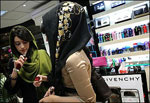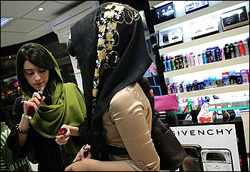 Washington Post: Iranian authorities have begun police patrols in the capital to arrest women wearing clothes deemed improper.
Washington Post: Iranian authorities have begun police patrols in the capital to arrest women wearing clothes deemed improper.
The Washington Post
By Thomas Erdbrink
Washington Post staff writer
Wednesday, June 2, 2010; A07
 TEHRAN — Iranian authorities have begun police patrols in the capital to arrest women wearing clothes deemed improper. The campaign against loose-fitting veils and other signs of modernism comes as government opponents are calling for rallies to mark the anniversary of the disputed presidential election, and critics of the crackdown say it is stoking feelings of discontent.
TEHRAN — Iranian authorities have begun police patrols in the capital to arrest women wearing clothes deemed improper. The campaign against loose-fitting veils and other signs of modernism comes as government opponents are calling for rallies to mark the anniversary of the disputed presidential election, and critics of the crackdown say it is stoking feelings of discontent.
But hard-liners say that improper veiling is a “security issue” and that “loose morality” threatens the core of the Islamic republic.
Iran’s interior minister has promised a “chastity plan” to promote the proper covering “from kindergarten to families,” though the details are unclear. Tehran police have been arresting women for wearing short coats or improper veils and even for being too suntanned. Witnesses report fines up to $800 for dress considered immodest.
Some here say the new measures are part of a government campaign of intimidation ahead of the election anniversary this month. The hard-liners have grown more influential since the vote, which led to months of anti-government demonstrations that leaders saw as the biggest threat to the Islamic system in decades.
Iranian women are obliged by law to cover their hair and wear long coats in public. The Islamic veil protects the purity of women, preventing men from viewing them as sex symbols, clerics here say. But the law is imprecise, and interpretations vary.
On a recent day, two young women wearing bright pink lipstick and identical thigh-hugging beige coats strolled down Tehran’s affluent Bahonar Street. Their peroxide-blond hair, emphasized by delicately positioned brown scarves, spilled onto their shoulders.
When seminary student Fatemeh Delvari, 24, moved to Tehran from a provincial town eight months ago, she was shocked to see how some women dressed.
“My own veil oppresses my feminine side, so I can be free and active,” she said of her black chador, a garment that covers the entire body except the face and hands. “But some women seem to be only interested in looking beautiful.”
“They are trampling on social boundaries,” Delvari said. “Violence is not good, but they should be punished.”
Delvari, a leading member of the Students Justice-Seeking Movement, which aims to revive the values of the Islamic revolution, said authorities should also restrict makeup sales, prohibit jewelry and force women to “spend some nights from their families” in order to counter improper dress.
“Our Islamic system is like a ship; we can’t allow some of the passengers to make holes in the hull,” she said.
During the reign of Iran’s Western-backed Shah Mohammad Reza Pahlavi, bikinis and miniskirts were not uncommon here. But in the first years after the 1979 Islamic revolution, groups of Islamists armed with batons would beat women who were not veiled, shouting such slogans as “Cover up or feel the stick.”
In 2006, a year after President Mahmoud Ahmadinejad came to power, special moral “guidance” teams attempted to enforce dress codes in what was the most ambitious operation in recent memory. Hundreds of teams patrolled shopping centers and popular squares, stopping and sometimes arresting women they thought were poorly veiled.
Today some say the repetition of such punishments for a few women will have little effect in Tehran, a city of 12 million people.
“My white coat was three inches too short on the sleeves,” said Nadia, 15, a high school student who was arrested Tuesday. “It was impounded. The guidance police called my dad to pick me up and gave me a chador to wear on the way home,” she said.
“Such patrols come and go,” her father said. “But they leave mental scars of intimidation.”
Mohammad Hadi Ayyazi, deputy mayor of Tehran and former police commander, said the problem should not be exaggerated. “This is a cultural problem, not something the police can solve,” he said in an interview.
Some who tried years ago to get women to uphold the veil now say that force will not work.
“For some women, a different form of wearing the veil is also a protest against those that want them to only wear the chador,” Fatemeh Rakaee, a former lawmaker and former Islamic revolutionary, said in an interview. “Violence and patriarchy will never reach any results.”


